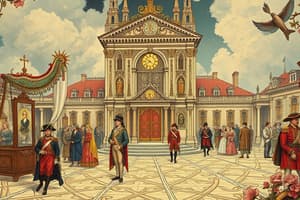Podcast
Questions and Answers
What event is commonly considered the start of the French Revolution?
What event is commonly considered the start of the French Revolution?
- King Louis XVI's execution
- Declaration of the Rights of Man and of the Citizen
- Storming of the Bastille (correct)
- Formation of the National Assembly
Which time period marks the significant events of the French Revolution and Napoleon?
Which time period marks the significant events of the French Revolution and Napoleon?
- 1789 to 1820
- 1776 to 1789
- 1799 to 1815
- 1789 to 1815 (correct)
Which of the following events occurred in 1789 during the French Revolution?
Which of the following events occurred in 1789 during the French Revolution?
- Storming of the Bastille (correct)
- Battle of Waterloo
- Constitutional monarchy established
- Napoleon's coronation
What was a significant result of the French Revolution?
What was a significant result of the French Revolution?
Which political figure is closely associated with the French Revolution and subsequent era of Napoleon?
Which political figure is closely associated with the French Revolution and subsequent era of Napoleon?
What event in 1789 significantly escalated the French Revolution?
What event in 1789 significantly escalated the French Revolution?
Which structure was stormed in Paris, leading to the outbreak of the French Revolution?
Which structure was stormed in Paris, leading to the outbreak of the French Revolution?
What year is marked as the beginning of the French Revolution?
What year is marked as the beginning of the French Revolution?
Which of the following events was NOT part of the early stages of the French Revolution?
Which of the following events was NOT part of the early stages of the French Revolution?
Which significant event occurred immediately after the storming of the Bastille in the context of the revolution?
Which significant event occurred immediately after the storming of the Bastille in the context of the revolution?
Flashcards
French Revolution start
French Revolution start
The French Revolution began in 1789, triggered by the storming of the Bastille.
Bastille storming
Bastille storming
A pivotal event in 1789 that marked the start of the French Revolution.
1789
1789
The year the French Revolution began.
French Revolution
French Revolution
Signup and view all the flashcards
Napoleon's Era
Napoleon's Era
Signup and view all the flashcards
Storming of the Bastille
Storming of the Bastille
Signup and view all the flashcards
What sparked the French Revolution?
What sparked the French Revolution?
Signup and view all the flashcards
Significance of 1789
Significance of 1789
Signup and view all the flashcards
Study Notes
French Revolution and Napoleon - 1789 to 1815
- The storming of the Bastille in 1789 ignited the French Revolution.
- King Louis XVI was executed by guillotine in 1793, marking the start of the Reign of Terror.
- Napoleon Bonaparte seized power in 1799 through a coup d'état.
- Napoleon crowned himself Emperor in 1804, initiating the creation of a vast European empire.
- Napoleon's reign ended with his defeat at the Battle of Waterloo in 1815.
World Events
- George Washington was inaugurated as the first US president in 1789.
- Great Britain seized the Cape Colony in South Africa from the Dutch in 1795.
- The Opium Wars began in China in the 1800s
- The Dominican Republic gained independence in 1804.
- The Mexican War of Independence began in 1810
- The War of 1812 concluded between Great Britain and the United States in 1814.
Setting the Stage for the French Revolution
- France was considered the most advanced European country in the 1700s.
- High population and foreign trade.
- French culture was widely praised.
- Disparity between the appearance of success and underlying issues like high prices, taxes and unrest.
- The ideas of Locke, Rousseau, and Voltaire questioned the existing political system.
The Estates of the Old Regime
- French society was divided into three estates:
- The First Estate (clergy): Wealthy, owned 10% of the land, paid little to no tax
- The Second Estate (nobility): Wealthy, owned 20% of the land, paid little to no tax
- The Third Estate (everyone else): Commoners, comprised 97% of the population, paid high taxes
- These estates had different rights and privileges.
The Third Estate
- The Third Estate was diverse, with three groups:
- Bourgeoisie: Middle class - bankers, factory owners, skilled artisans
- Workers: Tradespeople, apprentices, laborers, domestic servants
- Peasants: Majority of the Third Estate, heavily taxed, with limited land, resented the clergy and nobles.
- The economic hardship, high taxes, and lack of political power among the Third Estate fueled dissatisfaction.
Statistics (1787)
- First Estate: less than 1% of population, paid 2% of total income tax.
- Second Estate: 2% of population, paid 0% income tax.
- Third Estate: 97% of population, paid 50% of total income tax.
Forces of Change
- Enlightenment ideas influenced the revolution.
- Resentment against the privileges of the First and Second Estates.
- The growing power of the French Bourgeoisie.
- The economic crisis in France further exacerbated the situation.
The American Revolution
- The success of the American Revolution inspired the French revolutionaries.
- French leaders admired the new American principles of liberty and self-governance.
Studying That Suits You
Use AI to generate personalized quizzes and flashcards to suit your learning preferences.




